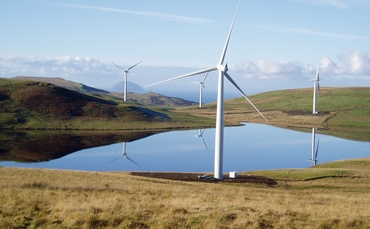'Entirely inadequate': Campaigners warn de facto ban on new onshore wind farms could remain in place

Over 100 business leaders, campaigners, and academics call on Ministers to ensure new planning rules genuinely ease barriers to new onshore wind farm projects
A group of business leaders and environmental campaigners have today written to the government, calling on it to fully deliver on its promise to lift the de facto ban on new onshore wind farms, amidst fears Ministers could retain significant barriers to new developments.
The letter, which was organised by campaign group Possible and backed by scores of green business leaders, campaigners, and academics, warns the government's recently proposed planning reforms would have little practical impact on new onshore wind farm projects that can currently be blocked if they face a single objection.
The government announced late last year it would allow new onshore wind farm projects where they could command local support, following a backbench rebellion that called for planning rules to be relaxed to allow more investment in new energy infrastructure.
But today's letter alleges the government's proposals, which are currently subject to consultation, would still make it extremely difficult for new projects to secure planning permission.
"The proposed changes to the National Planning Policy Framework which are currently under consultation are entirely inadequate to bring about the required change in policy," the letter states. "The decision to replace Footnote 54 with some marginally revised wording, in the form of new Footnotes 62 and 63, looks to be almost identical in effect, and inevitably means the effective ban will remain in place."
The footnotes refer to a clause in the framework that effectively excludes onshore wind farms from the National Planning Policy Framework, meaning that can be treated differently to other forms of onshore infrastructure.
The government is then expected to introduce some form of local referenda or consent mechanism, placing a significant additional barrier in the way of new onshore wind farm projects that is not faced by other infrastructure projects.
The letter argues that "onshore wind planning applications should be assessed on a level playing field with all other infrastructure projects".
"Let's end a policy that hampers both climate progress and energy security and open up the possibility of wind power across England now," it adds.
Speaking at an event yesterday, Energy and Climate Change Minister Graham Stuart, insisted the government was still "working hard to ensure more onshore wind farms can go ahead with community support".
However, the government is still yet to provide clarity on how community support will be assessed, meaning it remains unclear to what extent the de facto ban on new projects will be lifted.
Onshore wind farm developers have repeatedly highlighted polling that shows that new projects are broadly popular with the public. Some developers are also pursuing plans to offer communities close to new projects access to discounted power.
However, reports at the time the government announced it would change the planning rules suggested MPs who are opposed to new wind farm projects had been briefed that the new localo consent mechanism would still set a high bar for developers to clear if they wanted to secure planning permission.
* This article was originally published here
Comments
Post a Comment